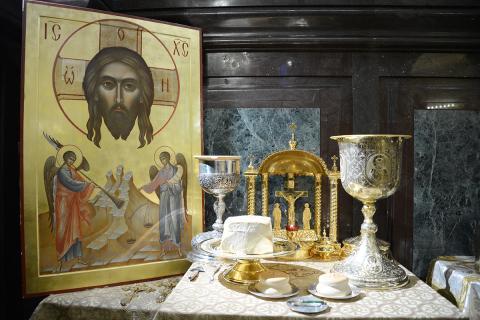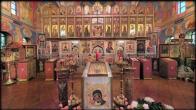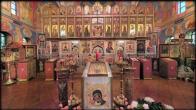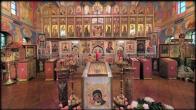You are here
Notes on the Liturgy and the Church.

S.I.Fudel
Chapter 8
Right after the announcement of the Blessed Kingdom of God the "Great Ektenia" [Great Litany] is read. The word ektenia signifies devoted, intense prayer. "In peace let us pray to the Lord…" "In peace" is in peace of the soul, in its serenity, in calm, "in peace and in council," i.e. with one mouth and one heart with other people. Here, in this prayer of the Liturgy, we once again raise ourselves up to the idea of the Church. Archpriest John of Kronstadt writes, "The Great Litany is an ektenia beyond wisdom, an ektenia of love; in it, Christians - those living as well as the saints - are seen to be one great community joining to make up body of Jesus Christ."
The second petition of the Litany is, once again, a prayer for peace. "For the peace from above and the salvation of our souls" is a reminder that everything in our life, any peace - in the soul, the family, society, and government - depends upon the peace that comes down from Heaven, from the World of God, which according to the Apostle "passeth all understanding." In acquiring it, we acquire salvation of the soul as well. After all, that salvation is in our unity with God, in our entry - still here on earth - into His Kingdom, which is "truth, peace and joy in the Holy Spirit." St. John Chrysostom writes, "There is nothing equal to it [peace - Ed.] and therefore we… everywhere ask for peace in the churches… and the protector of the church imparts it to the church once, twice, thrice, and many times over, (saying) 'peace be unto you'... for it is the mother of all good things, and the foundation of joy."
There follow a series of prayers or petitions in the ektenia for various good things in our earthly life, for our ecclesiastical administration and governmental authorities. Prayer for the authorities is grounded in a direct Apostolic commandment to pray for all [government] authorities, including pagan ones (see I Timothy 2: 2). In the 2nd Century, Tertullian wrote, "We pray from the heart, with arms upraised, for long life for the emperors, for the good estate of the empire, for the bravery of the armed forces, and the loyalty of the Senate." The ancient Christian Church, the Church of the Martyrs, was able to combine rejection estrangement from the world with prayer for that world, prayer for the emperors and prayer for those tortured by those emperors.
In some ancient liturgies, in addition to the petition for "the suffering and the imprisoned," there was the following petition "for those [working] in the mines and in exile, in prisons and incarcerated for the sake of the Lord's name, let us pray." In the liturgy of the "Apostolic Constitutions" there was a prayer "for those outside and gone astray," that [God] might turn them to good and tame there rage." Everything that happens to man and to the world, is according to the will of God, and He knows, better than we, what we need and what we do not need. For that reason, the Great Litany ends with turning everyone and everything over to the will of God: "let us commit ourselves and one another, and all our life unto Christ our God." The choir responds, "To Thee, O Lord." Holy Hierarch St. Dimitry of Rostov writes, "…in that is the kingdom, delight, joy and the light of the soul, that it love God; one who loves God, also loves in everything His holy will, and with great delight receives from His hands both the good and what appears to be bad; such a person is ready to receive even torture as [if it were] the kingdom, according to God's will. I knew one of the fathers, one who … prayed every day thus, "O Lord, if Thou shouldest want to have me in the light of Thy grace, blessed art Thou. If Thou shouldest want to have me in the darkness of rejection from Thy sight, likewise, blessed art Thou."
After the Great Litany, the so-called antiphons are chanted. The word "antiphon" refers to chanting by two choirs, the right and the left, alternately. The first antiphon is Psalm 102 "Bless the Lord, O my soul…. The Lord hath prepared his throne in the heavens, and His kingdom ruleth over all…." The second antiphon is Psalm 145: "Praise the Lord, O my soul, I will praise the Lord in my life, I will chant unto my God for as long as I have my being… (i.e. throughout my life. - S. F.)," Both psalms are Old Testament revelations of the idea of God. Thereafter, "O Only-begotten Son and Word of God" is chanted. All of this hymnody is filled with praises of God, "who executeth judgment for the wronged, who granteth food unto the hungry." However, "O Only-begotten Son" also reveals to us the great truth of faith, the "dogma" that Christ, the Son of God, is not only True God, "one with the Holy Trinity," but also true man, Who without change was incarnate of the holy Theotokos. The two natures of Christ, Divine and human, combine - without violating their individual characteristic quality - in Him in the unmingled unity of one Person, God-man, "who together with the Father and the Holy Spirit is glorified." After this, the choir sings the Commandments of the Beatitudes, recorded in Chapter 5 of the Gospel according to Matthew.
Nine New Testament Commandments added to the Ten Commandments of the Old Testament the great [fact] that they spread the power of the moral law over the internal workings of the soul. Christ said, "Ye have heard that it was said by them of old time, Thou shalt not kill, and whosoever shall kill shall be in danger of the judgment; But I say unto you, that whosoever is angry with his brother without a cause shall be in danger of the judgment," (Matthew 5: 21-22). Christ considered anger to be equal to murder, and secret desire to open sin. He cast a blinding light on the whole of the internal, hidden life of the soul, and everything in that life, even the most hidden thoughts and feelings now had to choose between light and darkness, whether to follow and obey Christ, or to go into bondage to the devil. There is also a great difference between the Commandments of the New Testament and those of the Old Testament. The Commandments of the Beatitudes are given as Commandments of personal good fortune; to follow them is not merely an obligation or requirement, but a condition of great joy, spiritual joy, a joy that is not allegorical, abstract joy, but one that is completely real. Those poor in spirit, those who mourn, those who are meek, those who are merciful, are truly fortunate, bearing within themselves Christ, their Teacher. St. Hermas writes, "Remove from yourself all sorrow, for it is the sister of doubt and anger... The prayer of a sorrowful man never has the power to go up to the throne of God... If you will be magnanimous, the Holy Spirit (the spirit of sanctity, or holiness - S. F.), making its abode in you, will be pure and will not be darkened by some king of evil spirit; rather, it will joyously expand together with its vessel (the flesh - S. F.), in which it makes its abode it will joyously serve the Lord." St. Hermas lived at the close of the 1st Century, in an epoch of persecutions.
One who lives a Christian life, simply perceives happiness and joy together with the difficulties, sorrows, sufferings, and heartaches in his life. He does not perceive and sense them because that is "required by the rubric" or because it is a "commandment," but because he cannot help but sense them. This is something that happens not somewhere on high, but at the very beginning of his [Christian] journey. "God is fire… The soul... is a sentient, intelligent being. That is why at the very first, it senses and recognizes the lighting (in itself. - S. F.) of that flame, and moreover, that it is accompanied by … unbearable aching (of the heart) (St. Symeon the New Theologian). But let no one think that when (as - S.F.) communion with God is man's ultimate goal, man would be made worthy of reaching that goal afterwards, for example after completion of all of his efforts. No: It (communion with God - S.F.) must be man's constant, ever-present, uninterrupted state. Thus, as soon as there is no communion with God, as soon at it is no longer felt, man must recognize that he has stepped outside his goal and his calling. (Bp. Theophan the Recluse, "Letters regarding Christian life." "There is a joy that is introductory, and different one that is a culmination… One must first use that introductory joy to invite the soul to engage in spiritual labors" (blessed Diadochos). In one of the prayers of St. Ambrose of Milan, "for presbyters preparing to serve the Holy Liturgy, it says "…remove a hard heart from our flesh and grant a heart that fears Thee, a loving [heart]… that follows Thee and draws nourishment from Thee." "Be so kind as to allow me, a sinner, to offer this heavenly sacrifice with fear and trembling, with a clear conscience, with flowing tears, in spiritual joy and divine merriment, that my mind may perceive the sweetness of Thy blessed presence, and the guardian host of Thy Holy Angels about me." "O sweetest Bread, heal the lips of my heart, that I might feel within me the sweetness of Thy love."
St. Symeon the New Theologian writes "Insensitivity is the death of the soul." Upon us are fulfilled the Lord's words that "what those with sight do not see and those with hearing plug up their spiritual ears and do not hear the words of the Spirit." Sensing the Divine warmth the joys and spiritual happiness is a foretaste of the age to come, and that 'sensation of the age to come in this world is the same thing as a small island in the sea; one who approaches it is no longer troubled by the sight of the waves of this age." (St. Isaac the Syrian). St. Symeon the New Theologian writes, "If you commune of the Most-holy Gifts without sensing some kind of grace in your soul, you only have the appearance of communing, and do not take anything into yourself…" "When you eat this Divine Bread and drink this Wine of Gladness, and yet do not perceive that you have awakened to eternal life, having partaken of the power of the light-bearing and fiery… that you have drunk of the Lord's Blood, like living water that causes rejoicing, if, I say, you do not sense within yourself that you have partaken of something of which I just spoke, how can you think that you have communed of life eternal… have become a communicant of the unceasing light?"
It is frightening to say, but some church-going people today have a kind of theory, directly contrary to [teachings of] the saints, that one must stand stock-still in church, i.e. not feeling anything except perhaps that obligation to stand in such a manner. For such people of false humility, the commandments have yet to become commandments of the beatitudes, and the Old Testament has not yet turned into the New. In them, the age-old sowing of religious externals brings forth its harvest. Makary the Great writes, "The Church ustav states that even if all of the church rules are fully carried out, but the mystical Eucharist has not been performed by the priest, and there has been no partaking of the Body of Christ, then the priestly liturgical action is incomplete, and the service of the Mystery is insufficient.
One should look upon the Christian in like manner: If he succeeds in fasting, in maintaining the vigil, in chanting psalms, in all spiritual struggles and virtues, but the grace of the mystical action of the Spirit has yet to work on the sacrificial altar of his heart, and in full spiritual calm is fully perceived, then all such rites of spiritual struggle are incomplete and almost useless, for the person does not have spiritual joy mystically working in his heart."
PARISH LIFE
RECENT VIDEOS
Address of our Cathedral
Subscribe to our mailing list
While all the materials on this site are copyrighted, you may use them freely as long as you treat them
with respect and provide attribution on the Russian Orthodox Cathedral of St.John the Baptist of Washington DC.









